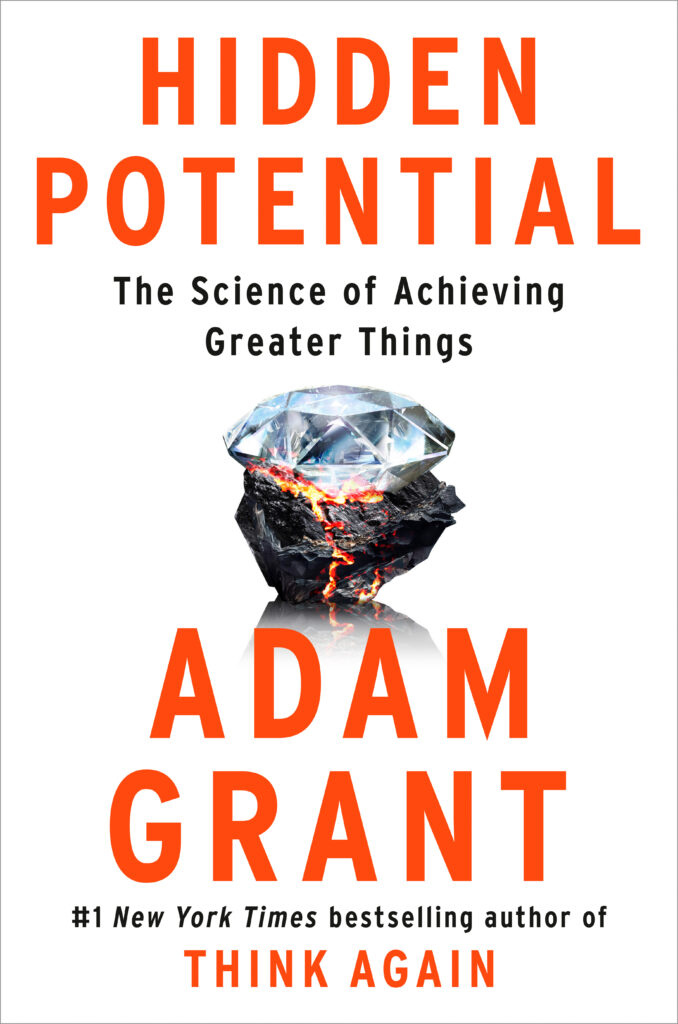Hidden Potential reveals several science-backed ways to grow, improve and succeed. To begin, focus on enhancing your character, which is the capacity to prioritize your values over instincts. Unlike personality, character is a learned skill and to improve it, we need to embrace discomfort. Akin to working out, accepting temporary discomfort while pushing the limits of your cognitive ability is what sows the seeds to growth and improvement.
Adam explains that growth is more a function of how well you learn rather than how hard you work. Learning can be improved by putting your work product and ideas in writing. The act of writing exposes gaps in knowledge and logic, forcing you to iterate towards clarity. Learning can also be enhanced by teaching. Amazingly, this works best when you have the courage to teach a topic that you are simultaneously learning for the first time.
Surprisingly, perfectionism often hinders growth, and even aiming to do your best is suboptimal. This inefficiency stems from the lack of specificity of what “your best” means (i.e., it’s hard to define when you’ve achieved it). Instead, define precise and challenging goals that give you permission to move on once you’ve accomplished them.
This book has affirmed some of my previous learning habits (such as writing this blog to reinforce book-based learnings), and exposed me to many new ones. Adam has such a rich and clear writing style that provides many more insights than the typical books I read. As such, this blog post doesn’t do the book full justice. If this post piqued your interest, go ahead and borrow or buy the book. You won’t regret it.
You should read this book if you…
- want to learn and improve in any domain
- seek ways to enhance your team’s growth
- want to understand how to better assess talent based on how far they’ve come vs where they are now
Additional Information
Year Published: 2023
Book Ranking (from 1-10): 10 – Superb – Changed the way I live my life
Ease of Read (from 1-5): 2 – Quick read
Key Highlights
- Potential is not a matter of where you start, but of how far you travel. We need to focus less on starting points and more on distance traveled
- Ambition is the outcome you want to attain. Aspiration is the person you hope to become
- Character is more than just having principles. It’s a learned capacity to live by your principles
- In learning, scaffolding serves a similar purpose. A teacher or coach offers initial instruction and then removes the support. The goal is to shift the responsibility to you so you can develop your own independent approach to learning
- They weren’t worried about being the smartest player in the room—they were aiming to make the room smarter
- Character is often confused with personality, but they’re not the same. Personality is your predisposition—your basic instincts for how to think, feel, and act. Character is your capacity to prioritize your values over your instincts. If personality is how you respond on a typical day, character is how you show up on a hard day
- Becoming a creature of discomfort can unlock hidden potential in many different types of learning. Summoning the nerve to face discomfort is a character skill—an especially important form of determination. It takes three kinds of courage: to abandon your tried-and-true methods, to put yourself in the ring before you feel ready, and to make more mistakes than others make attempts. The best way to accelerate growth is to embrace, seek, and amplify discomfort
- Writing is more than a vehicle for communicating—it’s a tool for learning. Writing exposes gaps in your knowledge and logic. It pushes you to articulate assumptions and consider counterarguments. Unclear writing is a sign of unclear thinking
- Comfort in learning is a paradox. You can’t become truly comfortable with a skill until you’ve practiced it enough to master it. But practicing it before you master it is uncomfortable, so you often avoid it. Accelerating learning requires a second form of courage: being brave enough to use your knowledge as you acquire it
- Growth is less about how hard you work than how well you learn
- Absorptive capacity is the ability to recognize, value, assimilate, and apply new information. It hinges on two key habits. The first is how you acquire information: Do you react to what enters your field of vision, or are you proactive in seeking new knowledge, skills, and perspectives? The second is the goal you’re pursuing when you filter information: Do you focus on feeding your ego or fueling your growth?
- Learning is more likely when people are reactive and growth oriented. Responding with an eye toward improvement makes people moldable, like clay. They’re often praised as coachable or teachable. They’re not worried about whether criticism will hurt their egos; they embrace the discomfort and internalize whatever input might help their development. The problem is that they don’t seek information beyond what’s easily available. They don’t make much progress until someone picks them up and shapes them. Their growth depends on guidance from others—they rarely take their learning into their own hands. The sweet spot is when people are proactive and growth oriented. That’s when they become sponges. They consistently take the initiative to expand themselves and adapt
- When they have helpful input, people are often reluctant to share it. We even hesitate to tell friends they have food in their teeth. We’re confusing politeness with kindness. Being polite is withholding feedback to make someone feel good today. Being kind is being candid about how they can get better tomorrow. It’s possible to be direct in what you say while being thoughtful about how you deliver it
- Instead of seeking feedback, you’re better off asking for advice. Feedback tends to focus on how well you did last time. Advice shifts attention to how you can do better next time
- Wabi sabi is the art of honoring the beauty in imperfection. It’s not about creating intentional imperfections. It’s about accepting that flaws are inevitable—and recognizing that they don’t stop something from becoming sublime
- Ask two questions: Did you make yourself better today? Did you make someone else better today? If the answer to either question is yes, it was a good day
- Pivoting is a popular concept in Silicon Valley, where it’s often said that done is better than perfect. To rapidly iterate and improve, entrepreneurs and engineers are advised to build a minimum viable product. But excellence is a higher standard: for me, that means aiming for a minimum lovable product
- I came to see that the Tetris effect illustrates four key features of scaffolding. One: Scaffolding generally comes from other people. Two: Scaffolding is tailored to the obstacle in your path. Three: Scaffolding comes at a pivotal point in time. Four: Scaffolding is temporary
- Elite musicians are rarely driven by obsessive compulsion. They’re usually fueled by what psychologists call harmonious passion. Harmonious passion is taking joy in a process rather than feeling pressure to achieve an outcome
- Deliberate play is a structured activity that’s designed to make skill development enjoyable. It blends elements of deliberate practice and free play. Like free play, deliberate play is fun, but it’s structured for learning and mastery along with recreation. It’s built to break complex tasks into simpler parts so you can hone a specific skill
- But research suggests that the people with the most discipline actually use the least amount of it. My colleague Angela Duckworth finds that instead of relying on willpower to push through a strenuous situation, they change the situation to make it less strenuous
- When our performance stagnates, before it improves again, it declines. When people’s skills stalled in tasks ranging from Tetris to golf to memorizing facts, they didn’t usually ascend again until after they had deteriorated
- It turns out that if you’re taking a new road, the best experts are often the worst guides. There are at least two reasons why experts struggle to give good directions to beginners. One is the distance they’ve traveled—they’ve come too far to remember what it’s like being in your shoes. It’s called the curse of knowledge: the more you know, the harder it is for you to fathom what it’s like to not know
- Languishing is the emotional experience of stalling. You may not be depressed or burned out, but you definitely feel blah
- Psychologists call this the tutor effect. It’s even effective for novices: the best way to learn something is to teach it. You remember it better after you recall it—and you understand it better after you explain it. All it takes is embracing the discomfort of putting yourself in the instructor’s seat before you’ve reached mastery
- Coaching is the opposite of what we usually do when we need help. In trying times, our first instinct is to pick up the phone and ask for advice. We’re better off pausing to reflect on the advice we’ve provided in the past or calling someone in a similar situation and offering them some suggestions. We should listen to the advice we give to others—it’s usually the advice we need to take for ourselves
- In organizational psychology, culture has three elements: practices, values, and underlying assumptions. Practices are the daily routines that reflect and reinforce values. Values are shared principles around what’s important and desirable—what should be rewarded versus what should be punished. Underlying assumptions are deeply held, often taken-for-granted beliefs about how the world works. Our assumptions shape our values, which in turn drive our practices
- The best teams have the most team players—people who excel at collaborating with others
- Collective intelligence is best served by a different kind of leader. The people to promote are the ones with the prosocial skills to put the mission above their ego—and team cohesion above personal glory. They know that the goal isn’t to be the smartest person in the room; it’s to make the entire room smarter
- With a team of sponges, the best leader is not the person who talks the most, but the one who listens best
- To unearth the hidden potential in teams, instead of brainstorming, we’re better off shifting to a process called brainwriting. The initial steps are solo. You start by asking everyone to generate ideas separately. Next, you pool them and share them anonymously among the group. To preserve independent judgment, each member evaluates them on their own. Only then does the team come together to select and refine the most promising options. By developing and assessing ideas individually before choosing and elaborating them, teams can surface and advance possibilities that might not get attention otherwise
- It’s often said that talent sets the floor, but character sets the ceiling
- Schools judge you as much for your performance three years ago as for three months ago—and they don’t even bother to look at the most recent and relevant data at all. We penalize people who rise after rocky starts when we should be rewarding them for the distance they’ve traveled
- Not long ago, it dawned on me that impostor syndrome is a paradox: Others believe in you You don’t believe in yourself Yet you believe yourself instead of them
- Success is more than reaching our goals—it’s living our values. There’s no higher value than aspiring to be better tomorrow than we are today. There’s no greater accomplishment than unleashing our hidden potential

Discover more from The Broader Application
Subscribe to get the latest posts sent to your email.
